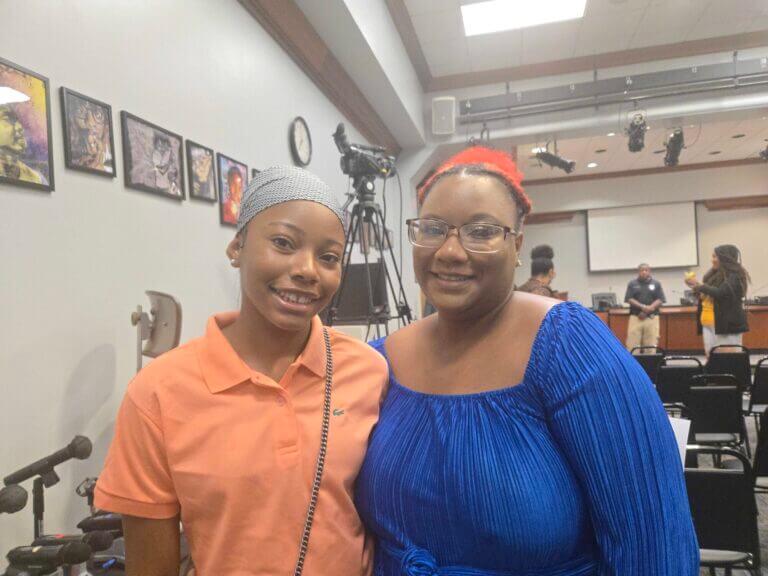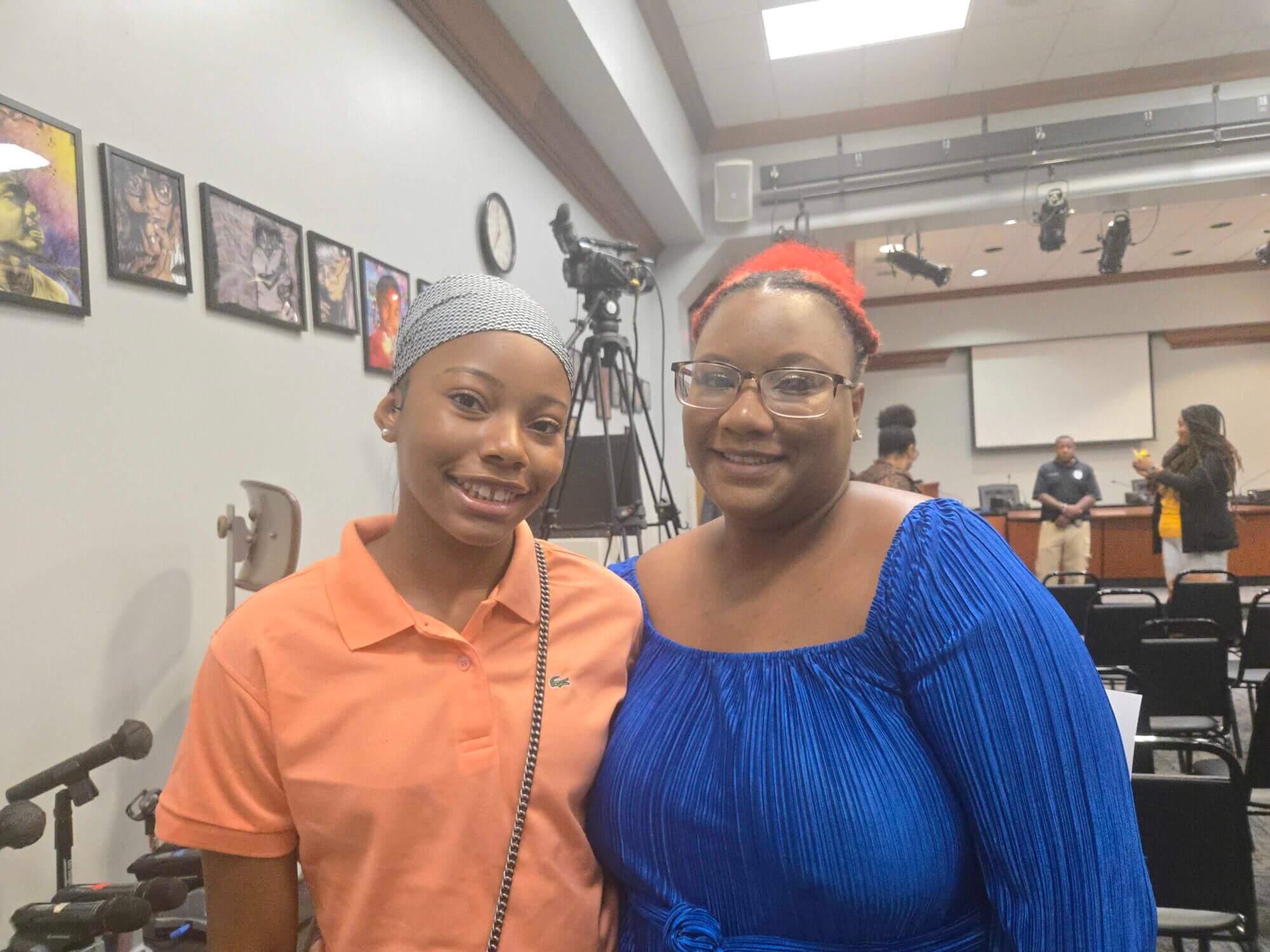

Superintendent Errick Greene wanted to be very clear with the roughly 50 parents who attended Thursday night’s community listening session: Jackson Public Schools already has a policy banning students from using cellphones at school.

But the leadership of Mississippi’s third-largest school district has decided that a new approach is in order, citing a series of incidents in recent years involving students using their cellphones to bully others, organize fights or text their parents inaccurate information about violence happening at or near their school.
“To be clear, it’s not the majority of our scholars, but I can’t look at a class and know who’s gonna be bullying today, who’s gonna be scheduling a meetup to cut up today,” Greene said toward the end of the hour-long meeting held at the JPS board room. “I can’t look at a group of scholars and say, ‘OK, yeah, you’re the one, let me take your phone, the rest of you can keep it.’”
Under the rewritten policy, students who take their phone out of their backpacks during the instructional day will lose it for five days for the first infraction, 10 days for the second and 45 days for the third. Currently, the longest the school will hold a phone is 10 days.
The Jackson school board is expected to consider the new policy at its meeting next week and the district hopes to implement the change when the new school year starts later this month, said Sherwin Johnson, the district’s communications director.
Students also currently have the option to pay up to a $25 fine to get their phone back, but the district wants to rescind that aspect of the policy.
“We’ve discovered that’s not equitable,” said Larrisa Harris, the JPS general counsel. “Not everybody has the resources to come and pay the fine.”
Support for the new policy among the parents who spoke at the listening session varied, but all had questions. How will students access the internet on their laptops if the WiFi is spotty at their school and they need to use their cellphone hotspot? If students are required to keep their phones in their backpacks during lunch, how will teachers prevent stealing? How will JPS enforce the ban on using cellphones on the bus?
One mother said she watches her daughter’s location while she rides the bus to Jim Hill High School so she knows her daughter made it safely.
“If they can’t have it on the bus, who’s gonna enforce that?” she said. “I’m just gonna be real, the bus driver got to drive.”
A common theme among parents was anxiety at the prospect of losing direct contact with their kids in the event of an emergency. A Pew Research survey found that most adults, regardless of political affiliation, support cellphone bans in middle and high school classes. But those who don’t say it’s because their child can use their phone during emergencies.
“If something happened, will we get an automatic alert to notify us? Because a lot of the time we see things on social media first,” said Ashley McIntyre, a mother of three JPS students. She attended the meeting with her eldest daughter, Aaliyah, who recently graduated from Powell Middle School.
Though JPS does have an alert system for parents, McIntyre said she didn’t know if it existed. She cited a bomb threat at Powell last year that she found out about because Aaliyah texted her, not through a school alert.
“We didn’t know what was going on, and she texted me, ‘Mom, I’m scared,’ so I went up there,” McIntyre said. “So that puts us on edge.”
Aaliyah said she uses her phone to text her mom and watch TikTok, but she feels like her classmates use their phones to be popular or to fit in. When a fight happens, she said many students pull out their phones to record instead of trying to get an adult who can stop it. Then the videos end up on Instagram pages dedicated to posting fights in JPS.
“Once the principal found out about the fight pages, they came around looking inside our videos and camera rolls,” she said. “It happened to me last year. They thought I had a fight on my phone.”
Toward the end of the meeting, Laketia Marshall-Thomas, the assistant superintendent for high schools, took the mic to respond to one parent who said she was concerned that older students would not come to school if they knew their phone could be taken.
“What we have seen is, it’s the older students—” Marshall-Thomas began.
“They are the problem,” someone from the audience chimed in.
“We’re not saying they cannot have them,” she continued. “We know that they have after school activities and they need to communicate with their moms … but we have had major, major issues with cellphones and issues that have even resulted in criminal outcomes for our scholars, but most importantly, our students … have experienced a lot of learning loss.”
While the district leadership did not go into detail about the criminal incidents, several pointed to instances where students have texted their parents inaccurate information, such as an unsubstantiated rumor there was a gun during a fight at Callaway High School or that a shooting outside Whitten Middle School occurred on school property.
“Having phones actually creates far more chaos than they help anyone,” Greene said.
While cellphones have been banned to varying degrees in U.S. schools for decades, youth mental health concerns have renewed interest in more widespread bans across the country. Cellphone and social media usage among school-aged kids is linked to negative mental health outcomes and instances of cyberbullying, research shows.
At least 11 states restrict or ban cellphone use in schools. After Mississippi’s youth mental health task force recommended that all school districts implement policies that limited cellphone and social media usage in classrooms, a bill that would’ve required school boards to create cellphone policies died during the legislative session. Still, several Mississippi school districts have passed their own policies, including Marshall County and Madison County.
Another concern about the ban was a belief among a couple of speakers at the meeting that cellphones can help parents hold the district accountable for misdeeds it may want to hide.
“I just saw a video today. It was not in JPS, but it was a child being yelled at by the teacher and had he not recorded it, his momma would have never known that this sweet lady that they go to church with is degrading her child like that,” one mother said.
Statements like these prompted responses from teachers and other parents who urged the skeptical attendees to be more trusting or to make sure the district has updated contact information for them in case school officials need to reach parents during an emergency.
“I think we have to trust the people watching over our children,” said one of the few fathers who spoke. “When I grew up, what the teacher said was gold.”
One teacher asked the audience, “Will you trust us?”
- State Supreme Court considers reviving former Gov. Phil Bryant’s lawsuit against Mississippi Today over welfare scandal coverage - February 18, 2026
- Winter storm update: Mississippi still waiting on fed declaration for individual assistance, lawmakers crafting plan to fund recovery - February 18, 2026
- Shy of special session, Mississippi school choice appears dead - February 18, 2026